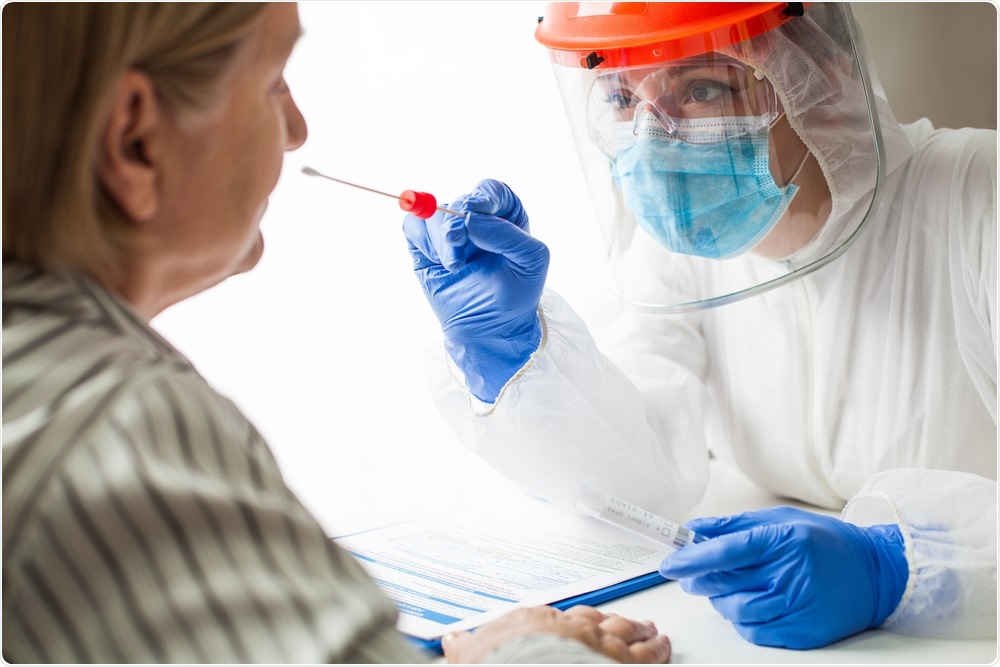The Canadian province of Quebec was hit by the coronavirus disease 2019 (COVID-19) pandemic towards the end of February 2020, which mobilized the healthcare network in an unprecedented way. Quebec’s laboratory network was able to provide 39,000 tests daily due to the development of an in-house nucleic amplification test (NAAT) by the Laboratoire de sante publique du Quebec (LSPQ).
The healthcare system of Quebec was put under strain because of the exponential increase of COVID-19 cases during the second and third waves of the pandemic. Due to the increase in cases, the need for testing grew, which required several strategies to maintain the level of mass-scale testing.
 Study: Natural spring water gargle samples as an alternative to nasopharyngeal swabs for SARS-CoV-2 detection using a laboratory developed test. Image Credit: Cryptographer / Shutterstock.com
Study: Natural spring water gargle samples as an alternative to nasopharyngeal swabs for SARS-CoV-2 detection using a laboratory developed test. Image Credit: Cryptographer / Shutterstock.com
The most recommended testing method is the oral and nasopharyngeal swab (ONPS); however, this sampling method is invasive and requires trained professionals. Several alternative testing methods have been proposed, such as those utilizing saliva and gargle.
Research of the saliva method has shown high sensitivity; however, there have been issues with the quantity of saliva produced by some individuals. A team of researchers from a variety of institutions validated the use of spring water gargle (SWG) as an alternative to ONPS for the detection of the severe acute respiratory syndrome coronavirus 2 (SARS-CoV-2) with a laboratory-developed test.
About the study
When compared to the ONPS, the clinical sensitivity of the laboratory-developed NAAT (LD-NAAT) from SWG was significantly lower. Among the different subgroups in this study that included age, location, history of contact or symptoms compatible with COVID-19, the differences in sensitivity varied widely.
The authors further subdivided patients according to the duration of symptoms, which revealed that test sensitivity was similar among patients who displayed symptoms less than three days before testing. Comparatively, a difference of 35.7% was observed in patients who were symptomatic at least seven days before testing.
As shown with the Kappa values varying from 0.93 to 0.96, the agreement with the three comparator assays was excellent. There were more positive SWG samples detected through LD-NAAT following chemical extraction as compared to when thermal lysis was used.
Out of all SWG samples, 18 were shown to be positive with the Simplexa COVID-19 Direct assay and the LD-NAAT. When the LD-NAAT was compared with the cobas SARS-CoV-2 test, the positive percent agreement was 90.7%.
Mean comparator cycle threshold (Ct) values were significantly higher on discordant samples than with concordantly positive SWG samples. When compared to the SWG samples, the mean Ct values for positive samples for ONPS were much lower.
There was considerable variability observed between the ΔCt of the two sample types, with a mean ΔCt among the concordant positive samples of 6.7. When compared to discordant paired samples, paired concordant samples displayed a much lower mean ONPS Ct value.
Implications
The results from this study demonstrate that SWG is a less sensitive sampling method than ONPS when tested with a laboratory-developed test preceded by thermal lysis. However, samples with lower amounts of viral ribonucleic acid (RNA) are typically the samples that exhibit this loss of clinical sensitivity.
Since SWG is a non-invasive method, the loss of sensitivity may be compensated by the higher acceptability, which may result in a higher rate of detection on a population-based perspective. However, if there is a high suspicion of COVID-19 with a patient, a repeated test with ONPS should be considered.